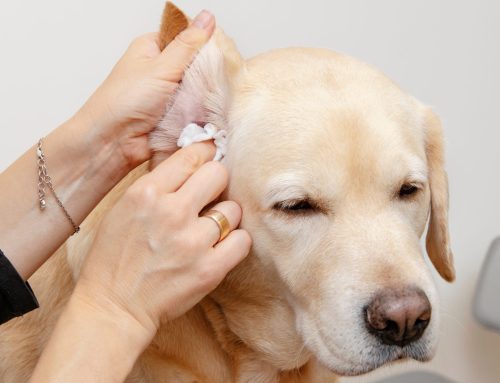If your pet is constantly scratching, you likely want to make their itchiness stop. Determining what is causing their itchy skin and treating the underlying problem can be challenging. Our Village Veterinary Hospital team sees itchy pets every day, and we want to offer do’s and don’ts to help address your furry friend’s itchy skin.
DO seek veterinary help for your itchy pet
The constant scratching, biting, chewing, and rubbing are miserable for your pet and can lead to raw skin and infection if left untreated. Itchy skin is a concern and should be evaluated by a veterinary professional. Diagnostics we may perform include:
- History — Knowing your pet’s medical history is important. Questions we may ask include:
- When did your pet’s signs start?
- Have they experienced itchy skin before?
- Are they on year-round flea control?
- Has their itchiness worsened since the signs started?
- Have there been any changes in their diet or environment?
- Is your pet on any medication?
- Physical examination — We will evaluate your pet thoroughly from head to tail, making note of any skin lesions and their location.
- Blood work — We may perform blood tests, including a complete blood count, biochemistry profile, and potentially a thyroid panel, to assess your pet’s health and rule out conditions that could contribute to skin lesions and hair loss.
- Skin scraping — In some cases, we may take scrapings in areas where your pet has skin lesions to check for skin pathology and parasites.
- Culture — Skin infections can cause itchiness and also can occur secondary to underlying issues such as allergies. If we suspect a skin infection, we may take a sample of the affected skin to determine the problem’s exact cause.
DON’T neglect your pet’s flea prevention
Flea allergy dermatitis (FAD) is the most common cause of itchiness in pets. This condition results from an allergy to the flea’s saliva, and affected pets can react strongly after even one flea bite. Fleas can also exacerbate other issues that result in itchiness. Providing year-round flea control is important for all pets to prevent itchiness. These products also usually protect your pet from other parasites, such as ticks, heartworms, and intestinal parasites.
DO monitor your pet’s itchiness
If you notice your pet’s itchiness has a seasonal occurrence, they could have atopy, which is the second most common cause of pet itchiness. This is an allergic reaction to things in their environment, such as dust mites, grass and tree pollen, and/or mold spores. Affected pets have a weakened skin barrier that allows allergens to enter and cause inflammation. These pets often also suffer from chronic or recurrent ear infections. Once your pet is diagnosed with atopy, allergy testing can be performed to determine the exact environmental factor causing the problem and develop hyposensitization treatment. Options for allergy testing include:
- Intradermal allergy testing (IDAT) — IDAT involves injecting small amounts of allergen under your pet’s skin. If swelling occurs at the injection site, they are sensitive to the allergen. Your pet must be off all allergy medications for at least two weeks before the test.
- Radioallergosorbent test (RAST) — RAST is blood allergy testing for pets that measures IgE antibodies, which are produced by the immune system in response to allergens. This test does not require your pet to stop taking their allergy medication, but results can take up to six weeks to return.
This information is used to create hyposensitization treatment, which is considered the best strategy to address atopy. This treatment, commonly called allergy shots, involves administering gradually increasing allergen doses to desensitize your pet to the problematic allergen. Most pets respond well to hyposensitization treatment, but allergy shots can take about six to 12 months to be fully effective.
DON’T think a grain-free diet is the answer to your pet’s itchiness
Many owners think they can simply change their pet’s food to a grain-free diet to alleviate their itching. The truth is that food allergies aren’t that common in pets. Only about 1% to 2% of dogs and less than 1% of cats have food allergies. In addition, when pets are diagnosed with food allergies, a protein like chicken, beef, dairy, eggs, or soy is most often to blame. If a food allergy is suspected, the only way to definitively diagnose the condition and determine the problem ingredient is to perform a food trial with your veterinarian’s guidance. Steps include:
- Selecting an appropriate diet — Our goal is to find a diet that has ingredients your pet has never eaten. Your choices are a hypoallergenic diet that contains a novel protein, such as venison, rabbit, duck, kangaroo, or bison, or a hydrolyzed diet in which the protein is broken down to the point where the body doesn’t recognize it.
- Feeding the diet — During the diet trial, your pet must only eat the trial diet. This means no treats, medicated chews, table scraps, or foraging outdoors. Any lapse in the diet can skew the results. Diet trials typically take about six to eight weeks to see results.
- Determining the reactive ingredient — If your pet responds favorably to the diet trial, we can gradually reintroduce ingredients from their previous diet to determine what caused the reaction.
- Avoiding the ingredient — Once the problematic ingredient is identified, your pet must avoid this ingredient to prevent a reaction.
DO bathe your pet frequently

Removing allergens from your pet’s skin and coat can help reduce their itchiness. However, too frequent bathing can dry out their skin and worsen itching. Most pets should be bathed about once a week in lukewarm water, and with a veterinary-recommended shampoo. It is also helpful to wipe down their coat with a wet cloth every time they come in from outside.
If your pet is constantly scratching, DO contact our Village Veterinary Hospital team because we DON’T want your pet’s itchiness to continue.



















Leave A Comment